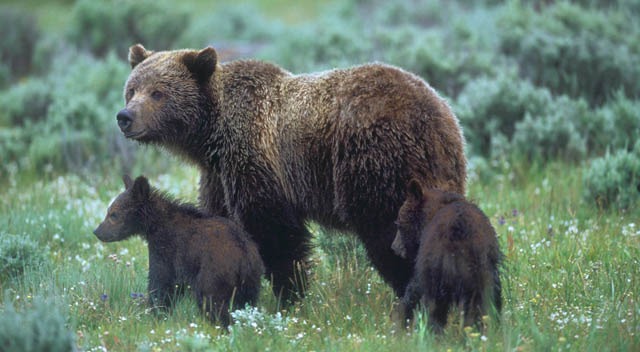Why We Can’t Stand It when Other Animals Treat Us like Animals
So, on the heels of Cecil the lion being killed by someone who thinks animal lives are inherently worthless (except as trophies), Yellowstone National Park is expected to kill the mother bear who attacked and partially consumed a hiker last week.
First, the Park should not be allowed to get away with the euphemism “euthanasia”. What they plan to do has nothing whatsoever to do with euthanasia. It is cold-blooded murder – the imposition of the death penalty on a member of another species for just being a member of that species.
Second, the Park is appealing to “protecting the public” as a justification for the killing. But the chances of being killed by a bear – even one who has killed before – are infinitesimal compared with other dangers in national parks, including just driving to the park! In the entire 142-year history of Yellowstone National Park, there have been a reported eight deaths (including this one), most likely (but not certainly) caused by grizzly bears. And between 1980 and 2011 there have been over 90 million visitors to the park and only 43 injured by bears. That gives you the odds of 2.1 million to one of being injured by a bear, let alone killed. This decision is like trying to prevent lightning strikes (statistically it is the same risk) by preventing people from going outside during storms. And there are no data that I am aware of to support the claim that once a bear “tastes human flesh” he/she will kill again. This is such a rare occurrence that there could not possible be any reliable data on the matter.
In a paper entitled Denial of Death and the Relationship between Humans and Other Animals, my co-author Michael Mountain and
I explain how our anxiety about being mortal drives us to separate ourselves from the other animals. Anything that reminds us that we, just like them, are going to die and disintegrate into the ground, is something we need to distance ourselves from. And nothing reminds us of our animal nature and mortality more than being preyed upon by another animal. (A further paper on this topic by some colleagues at the University of Arizona provides new data demonstrating that when people are reminded of their mortality they tend to be more in favor of abusing and exploiting other animals.)
The mother bear who killed the hiker who had gone off-trail into her territory was simply protecting her cubs. But from our human viewpoint she had the audacity to remind us that we are animals. And that’s a truth we cannot seem to come to terms with.

